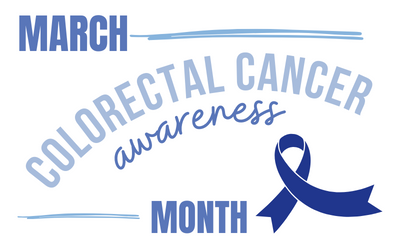Nobody particularly wants to talk about cancer and, somehow, the topic of colorectal cancer (cancers affecting the colon and rectum) seem even more uncomfortable to discuss.
However, it’s important for people ages 45 and older (according to the latest advice from the American Cancer Society) to stay ahead of any possible diagnosis by getting screened after your doctor advises you to do so.
March is colorectal cancer month – a very good time to become more knowledgeable about simple screenings that can diagnose cancer or let you know you are in the clear for the time being.
“Colorectal cancer is a term used to encompass both colon and rectal cancers. Both types of cancer can develop from colon polyps; and the symptoms and screening methods for both colon cancer and rectal cancer are the same,” according to FightColorectalCancer.org.
The Difference Between Colon and Rectal Cancers – and Why It Matters
Colon cancer originates in the cecum, ascending colon, transverse colon, descending colon or sigmoid colon. Rectal cancer originates in the rectum.
“In some cases, cancer can occur in the rectosigmoid segment, which is between the sigmoid colon and rectum. In this case, it may be classified as ‘colorectal cancer.’” the website explains.
The treatment you receive for your cancer may be different depending on the location of the diseased cells. That’s while a diagnosis is important. And, the earlier you get diagnosed, the sooner treatment can begin. When treated appropriately, early stage, localized colon and rectal cancers have a 90 percent survival rate, according to the National Cancer Institute.
Tests Used to Diagnose Colon Cancer
It’s important to talk with your doctor so he/she can determine your risk for colorectal cancer. Once your risk is determined, your doctor can suggest which screening option is best for you.
The gold standard for diagnosing colon and/or rectal cancer is colonoscopy. This is because during the procedure, the practitioner can see polyps and remove them immediately.
However, colonoscopy is an invasive operative procedure, performed under anesthesia. This test requires patients to prepare for the test by drinking a solution that will help clean out their lower intestine so the practitioner is able to clearly conduct an examination during the procedure. Cells from any suspicious areas will be collected and biopsied. This is a same-day hospital procedure.
If you are suffering with symptoms or have a high risk of developing colon or rectal cancer, colonoscopy is a clear choice for you.
Shawn White, MD, chief medical officer at Faith, said that another option for people who are at low risk is an at-home stool test called Cologuard. “This test is non-invasive and effective; the test’s manufacturer claims it is able to diagnose up to 92 percent of colon cancers,” he said, noting Cologuard does not require any preparation.
With Cologuard, you simply collect a sample of your stool in the bathroom, put some in the container included in the kit and mail the kit to the company using a prepaid label. When used for diagnostic purposes, the test is usually covered 100 percent by insurance companies if you are 45 years or older.
The one downside to a stool test like Cologuard is that these tests need to be repeated annually or every three years, depending on the specific test. On the other hand, a negative colonoscopy is usually repeated every 10 years unless the patient is at high-risk of developing colon or rectal cancer.
“Don’t wait! Make an appointment to see your family doctor to discuss your risk of colorectal cancer and follow their advice when it comes to screenings,” Dr. White said. “At Faith, we take the ‘better safe than sorry’ approach to routine health screenings. Don’t be afraid of a colonoscopy, if your doctor determines that’s the right method of screening for you. It might not be fun to prepare for, but it’s a whole lot better than finding out you have colon cancer.”
.

